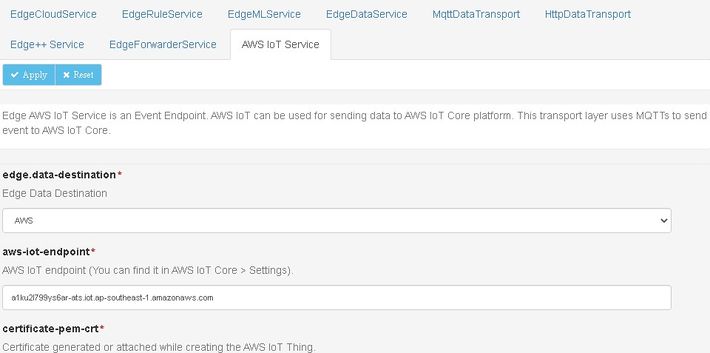Difference between revisions of "Custom Settings"
(Created page with "Edge to AWS IoT") |
(Tag: Visual edit) |
||
| (5 intermediate revisions by one other user not shown) | |||
| Line 1: | Line 1: | ||
| − | Edge to AWS IoT | + | === Edge AWS IoT Configuration === |
| + | * Setup the AWS IoT Core account and download the certificate, AmazonCA1 and private key. | ||
| + | * Open '''Cloud Services''' and go to the '''AWS IoT Service''' Tab. | ||
| + | * Edit All the Necessary fields like aws-endpoint, private key etc. | ||
| + | * Select AWS from the '''edge.data-destination''' dropdown menu (This determines where to send data like to datonis or aws). [[File:AWS IoT Service Tab.jpg|frameless|710x710px]] | ||
| + | * Go to '''EdgeDataService''' Tab and change '''connect.use-http-transport''' to '''true''' to use the AWS IoT Service. | ||
| + | * [[File:Use HTTP Transport.jpg|frameless]] | ||
| + | * Done. | ||
| + | |||
| + | === AWS IoT Latency Calculation === | ||
| + | Edge Sends a data-package to the AWS, each data-package can have multiple things data. The number of things data in a data-package can be configured through bulk_size. A data-package contains timestamp when it is ready to send whereas thing data contains individual thing '''scan timestamp, thing key, and data array'''. | ||
| + | |||
| + | Following will be the format for data : | ||
| + | |||
| + | <code>{</code> | ||
| + | |||
| + | <code>"events": [</code> | ||
| + | |||
| + | <code>{</code> | ||
| + | |||
| + | <code>"thing_key": "ft26ecabad",</code> | ||
| + | |||
| + | <code>"timestamp": 1641561474351,</code> | ||
| + | |||
| + | <code>"data": {</code> | ||
| + | |||
| + | <code>"tag_1": 2542</code> | ||
| + | |||
| + | <code>},{</code> | ||
| + | |||
| + | <code>"thing_key": "jt77eczb2d",</code> | ||
| + | |||
| + | <code>"timestamp": 1641561474357,</code> | ||
| + | |||
| + | <code>"data": {</code> | ||
| + | |||
| + | <code>"tag_1": 2542</code> | ||
| + | |||
| + | <code>},</code> | ||
| + | |||
| + | <code>"data_faas_function": "",</code> | ||
| + | |||
| + | <code>"type": "data"</code> | ||
| + | |||
| + | <code>}</code> | ||
| + | |||
| + | <code>],</code> | ||
| + | |||
| + | <code>"timestamp": 1641795756303</code> | ||
| + | |||
| + | <code>}</code> | ||
| + | |||
| + | Total time taken to deliver a data-package to destination that is time from scanning the very first thing data of the packet to till the acknowledge from the destination. To elaborate if data-package send timestamp is Send Timestamp[data-package], scan timestamp of very first thing data in the packet is Scan Timestamp[Thing1], time at which acknowledge received to Edge is Received Timestamp(acknowledge) then | ||
| + | |||
| + | '''Total time = (Send Timestamp[data-package] - Scan Timestamp[Thing1]) + (Received Timestamp[acknowledge] - Send Timestamp[data-package])''' | ||
Latest revision as of 08:10, 30 March 2022
Edge AWS IoT Configuration
- Setup the AWS IoT Core account and download the certificate, AmazonCA1 and private key.
- Open Cloud Services and go to the AWS IoT Service Tab.
- Edit All the Necessary fields like aws-endpoint, private key etc.
- Select AWS from the edge.data-destination dropdown menu (This determines where to send data like to datonis or aws).

- Go to EdgeDataService Tab and change connect.use-http-transport to true to use the AWS IoT Service.
-

- Done.
AWS IoT Latency Calculation
Edge Sends a data-package to the AWS, each data-package can have multiple things data. The number of things data in a data-package can be configured through bulk_size. A data-package contains timestamp when it is ready to send whereas thing data contains individual thing scan timestamp, thing key, and data array.
Following will be the format for data :
{
"events": [
{
"thing_key": "ft26ecabad",
"timestamp": 1641561474351,
"data": {
"tag_1": 2542
},{
"thing_key": "jt77eczb2d",
"timestamp": 1641561474357,
"data": {
"tag_1": 2542
},
"data_faas_function": "",
"type": "data"
}
],
"timestamp": 1641795756303
}
Total time taken to deliver a data-package to destination that is time from scanning the very first thing data of the packet to till the acknowledge from the destination. To elaborate if data-package send timestamp is Send Timestamp[data-package], scan timestamp of very first thing data in the packet is Scan Timestamp[Thing1], time at which acknowledge received to Edge is Received Timestamp(acknowledge) then
Total time = (Send Timestamp[data-package] - Scan Timestamp[Thing1]) + (Received Timestamp[acknowledge] - Send Timestamp[data-package])